|
Progressive Men
Index
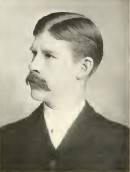 JAMES PAIGE an attorney at law, and a teacher
in the law department of the University of Minnesota,
was born November 22, 1863, at St. Louis. His
father is Rev. James Alexander Paige, a minister o£ the
Presbyterian church for over forty years. Rev. Mr. Paige
was a graduate of Princeton College and Theological
Seminary, and was the first chaplain appointed in the
War of the Rebellion by Abraham Lincoln. His commission
was dated June 4, 1862, and he was assigned to the
hospitals in the city of St. Louis, where he remained in
service during the entire war. He is now pastor of the
Presbyterian church at Carlton, Minnesota. His wife
Caroline Howe Paige, was the daughter of Hon. Zimri
Howe, of Castleton, Vermont. Her grandfather, John Howe,
served in the war of the Revolution, and her father,
Zimri Howe, was drafted in the War of 1812, and served
as secretary to General Ormes. He was a
graduate of Middlebury College, of which he afterwards
became trustee, and for many years was prominent at the
bar and on the bench of his native state. Another
ancestor of Mr.
Paige’s, whose name was McGoun, received by grant
from George III., the water power and adjacent land at
Ware, Massachusetts. It is thus seen that Mr. Paige
traces his ancestry back to very early New England
times. JAMES PAIGE an attorney at law, and a teacher
in the law department of the University of Minnesota,
was born November 22, 1863, at St. Louis. His
father is Rev. James Alexander Paige, a minister o£ the
Presbyterian church for over forty years. Rev. Mr. Paige
was a graduate of Princeton College and Theological
Seminary, and was the first chaplain appointed in the
War of the Rebellion by Abraham Lincoln. His commission
was dated June 4, 1862, and he was assigned to the
hospitals in the city of St. Louis, where he remained in
service during the entire war. He is now pastor of the
Presbyterian church at Carlton, Minnesota. His wife
Caroline Howe Paige, was the daughter of Hon. Zimri
Howe, of Castleton, Vermont. Her grandfather, John Howe,
served in the war of the Revolution, and her father,
Zimri Howe, was drafted in the War of 1812, and served
as secretary to General Ormes. He was a
graduate of Middlebury College, of which he afterwards
became trustee, and for many years was prominent at the
bar and on the bench of his native state. Another
ancestor of Mr.
Paige’s, whose name was McGoun, received by grant
from George III., the water power and adjacent land at
Ware, Massachusetts. It is thus seen that Mr. Paige
traces his ancestry back to very early New England
times.
His own life, however, with the exception of his
years at college, has been spent in the West. His early
education was obtained in the common schools and high
schools of Illinois and Missouri. At the age of sixteen
he entered Philips Andover Academy, at Andover,
Massachusetts, here he was first inspired with a desire
for a collegiate and professional education. Graduating
from Andover in 1883, he at once entered Princeton
College, from which institution he graduated in 1887,
receiving the degree of A. B. While in college, Mr.
Paige was president of his class for some time, and he
is now permanent secretary of the class
organization.
He was a Cliosophic and received the medal for
the best disputation in the Baird prize, with special
commencement honors in economics.
Three years after graduating he
received the degree of A. M. from Princeton. Shortly
after leaving college Mr. Paige came to Minneapolis, and
in the fall of 1887 he commenced the study of law. When
the law department of the University of Minnesota was
established, a year later Mr. Paige matriculated. He
graduated from the law school in 1890 with the degree of
LL. B., and he received the degree of LL. M. from the
same institution about three years later. In 1890 Mr.
Paige was admitted to the bar and formed a partnership
for the practice of law with his brother, Howe Paige,
under the firm name of Paige & Paige, which
partnership still continues. After being admitted to the
bar he became quiz master in the college of law, and
subsequently he became teacher in the same institution.
He has continued as a teacher in the law school for the
past seven years. During this time, in addition to his
professional work, he has published the following books:
“Illustrative Cases in Torts,” “Illustrative Cases in
the Law of Domestic Relations,” “Illustrative Cases in
Partnership,” “Illustrative Cases in Agency,”
“Illustrative Cases in Commercial Paper,” and “Charts in
Real Property:” and has now in course of publication in.
“Illustrative Cases in Criminal Law.” These books are
used largely throughout the law schools of the United
States. Mr. Paige is a member and officer of Westminster
Presbyterian Church. He was married on June 10, 1895, to
Miss Mabeth Hurd, daughter of Dr. Edward P. Hurd, of
Newburyport, Massachusetts
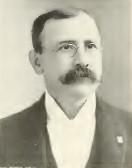 ALFRED WILSON
PARIS is a manufacturing confectioner and wholesaler of
fruits in Minneapolis. He is the son of
Henry Paris, a tea merchant, born in Liverpool, England,
who came to the United States in 1850. Henry Paris
married Catherine Tyler, of Gloucester, England, who is
still living at the age of eighty years. Both parents of
the subject of this sketch belonged to good families in
that class in England known as “gentlemen farmers,”’
people of comfortable circumstances and honorable
lineage. ALFRED WILSON
PARIS is a manufacturing confectioner and wholesaler of
fruits in Minneapolis. He is the son of
Henry Paris, a tea merchant, born in Liverpool, England,
who came to the United States in 1850. Henry Paris
married Catherine Tyler, of Gloucester, England, who is
still living at the age of eighty years. Both parents of
the subject of this sketch belonged to good families in
that class in England known as “gentlemen farmers,”’
people of comfortable circumstances and honorable
lineage.
Alfred Wilson Paris was born June
23, 1853, at London, Ontario. He attended the public
schools at Detroit, Michigan, until he was fourteen
years old. There being a large family (eleven children)
it became necessary for Alfred to go into business at an
early age. On this account he was deprived of the
advantages of higher education. He came to Minnesota in
the fall of 1881 and located in Minneapolis, where he
embarked in the confectionery business with a brother
and a Canadian named J. C. Stuart. The style of the firm
was Paris, Stuart & Co. The following spring Stuart
died, when S. J. Murton bought his interest and the firm
incorporated their business under the name of the
Paris-Murton Company, of which Alfred W. Paris was made
president. He still occupies that position. As above
indicated, Mr. Paris has carved out
his own fortune. The first money he ever earned was paid
him for loading barrel staves on a vessel at Detroit,
Michigan, when he was fourteen years of age. He got
twenty cents an hour and worked one day at the business,
but it made such an impression on him that he has never
forgotten it. He recalls it as the hardest day’s work he
ever did in his life. He learned the confectioner’s
trade in Detroit, mastering all its branches, and at the
age of twenty two was foreman in one of the largest
establishments in Michigan, in which over two hundred
people were employed. Subsequently he went to Jackson,
Michigan, where for six years he successfully conducted
a retail establishment. He then sold out and, taking
Greeley’s advice, came west. It was then he located in
Minneapolis.
Mr. Paris does not claim to belong
to any political party, but generally affiliates with
the Democracy, although he never voted a straight
ticket. In 1886 he was
nominated for alderman in the Eighth ward in
Minneapolis, but was defeated, although he polled the
largest vote ever cast for a Democrat in that ward. Mr.
Paris is an active member of the Jobbers’ Union, a
member of the Royal Arcanum, is a Mason and a Shriner.
He is not identified by membership
with any church but grew up in the Episcopal Church.
October 4, 1880, he married Lizzie Chapman, at Jackson,
Michigan, and has two sons living, Harold Chapman and
Benjamin Mosher. Mr. Paris is at present general manager
as well as president of the Paris-Murton Company, and
devotes his personal attention to the conduct of that
successful concern. He has invented and patented a
number of useful and valuable machines in connection
with his business, which are extensively used both in
England and in this country. Mr. Paris is a man who
extracts a great deal of pleasure out of life, is a good
entertainer and the life of any company in which he may
happen to be thrown.
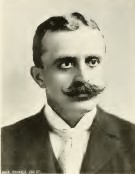 GEORGE
HENRY PARTRIDGE, a member of the firm of Wyman,
Partridge & Co., wholesale dry goods merchants of
Minneapolis, is a splendid example of the wide awake,
progressive, enterprising and yet shrewd and judicious
businessman. GEORGE
HENRY PARTRIDGE, a member of the firm of Wyman,
Partridge & Co., wholesale dry goods merchants of
Minneapolis, is a splendid example of the wide awake,
progressive, enterprising and yet shrewd and judicious
businessman.
He is the son of George H.
Partridge and Mary E. Francis (Partridge), and was born
at Medford, Steele county, Minnesota, August 21, 1856.
His father was a farmer who responded to the call of his
country when it was menaced by war and died in the
service. Mr. Partridge’s parents
moved from Wisconsin in the early days to Minnesota, and
his education was commenced in the public schools of
Steele County.
Subsequently he graduated at the
State Normal School at Winona, and finally entered the
State University of Minnesota and graduated with the
class of 1879. During his school years he was dependent
very largely upon his own resources, and displayed in
that time the pluck and perseverance which have
contributed in so large a degree to his remarkable
business success. Upon the conclusion
of his university course he obtained employment with the
firm of Wyman & Mullen, wholesale dry goods
merchants in Minneapolis, and was given charge of the
department of credits. He developed extraordinary
business capacity and made himself invaluable to this
firm. His ability and industry were recognized in 1890,
when Mr. Mullen retired on account of ill health and Mr.
Partridge, who had then been nearly ten years in the
employ of the firm, came in as a partner, the style of
the firm being Wyman, Partridge & Co., and composed
of O. C. Wyman, George H. Partridge and Samuel D.
Coykendall. This is the largest wholesale dry goods
house in the Northwest, and its business has grown
within a decade from half a million a year to probably
ten times that amount.
Mr. Partridge is a democrat and
takes an active interest in local and national
politics. He is relied upon by
his party for important service on committees and in
campaign work, and never shirks his duty as a citizen in
that respect. Mr. Partridge was married January 24,
1882, to Adelaide Wyman, daughter of O. C.
Wyman, and has three children, Helen, Marion and
Charlotte. He is constantly strengthening his position
in business circles in the Northwest, and not only has
already achieved a brilliant commercial career, but has
a prospect of still greater success in the future. This
he has accomplished by his ability and fidelity in a
responsible business position and unaided by the
influence of friends or the possession of wealth with
which to pave the way.
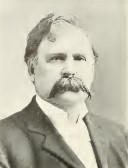 WILLIAM
SULLIVAN PATTEE. Dean W. S. Pattee, of the College of
Law of the University of Minnesota, was born at Jackson,
Waldo County, Maine, on September 19, 1846. His father,
Daniel Pattee, was of English descent. The first
representatives of the family came to this country in
about 1660, settling in Massachusetts. The Pattees were
among the early settlers of Maine, as were also the
Bixbys, from which family came Mrs. Pattee, the mother
of the subject of this sketch. Daniel Pattee died at the
age of thirty, leaving his wife the care of the two
children, Helen and William. She was a woman of great
strength of character, and for five years supported
herself and children. She then married Isaac Cates, a
farmer, living in the town of Jackson. WILLIAM
SULLIVAN PATTEE. Dean W. S. Pattee, of the College of
Law of the University of Minnesota, was born at Jackson,
Waldo County, Maine, on September 19, 1846. His father,
Daniel Pattee, was of English descent. The first
representatives of the family came to this country in
about 1660, settling in Massachusetts. The Pattees were
among the early settlers of Maine, as were also the
Bixbys, from which family came Mrs. Pattee, the mother
of the subject of this sketch. Daniel Pattee died at the
age of thirty, leaving his wife the care of the two
children, Helen and William. She was a woman of great
strength of character, and for five years supported
herself and children. She then married Isaac Cates, a
farmer, living in the town of Jackson.
His son William grew up on the
farm, remaining at home until he was twenty-one years of
age. During his boyhood and youth he attended the common
schools of the vicinity somewhat irregularly. When he
was seventeen he spent one term at the Bucksport
academy. He then taught school for a term, and
afterwards, in 1865, went to Kents Hill, where he
attended the Maine Wesleyan Seminary for parts of three
years, at the same time supporting himself by teaching,
working on the farm, and finding whatever he could find
to do. While there he decided to prepare for college,
and he entered Bowdoin in the sophomore year, and
graduated with honor in 1871.
Mr. Pattee attributes his first
impulse toward a college education to the influence of
Mr. James Crawford, principal of the Bucksport school,
who fired the young man with a desire for a broader
education. This desire was increased by the influence of
Henry P. Torsey, the president at Kents Hill. In Bowdoin
Mr. Pattee was under the influence of President Samuel
Harris, who did much to awaken his mind to the benefits
of philosophical study, and to stimulate him to research
in that direction. While in the preparatory schools and
in college, Mr. Pattee excelled in debate, and he took
several prizes for excellency in oratorical work. He was
orator of his class in 1871, and delivered the oration
on class day. His education was the result of steady
perseverance and continuous hard work, both at his books
and at manual labor, and other employments which were
necessary to furnish the means for his education. He
received no financial assistance whatever, but on the
contrary was able, by strict economy, to render his
people much assistance. He early adopted a habit of
systematic reading, which he has continued during life
and which has been, in a large measure, the secret of
his success in self-education and in his profession.
Immediately upon his graduation from Bowdoin, Mr. Pattee
became the principal of the public schools in Brunswick,
Maine, and held the position until March, 1872, when he
became professor of Greek in Lake Forest University,
Illinois. At Lake Forest he also lectured upon botany
and other branches of natural science.
In June, 1874, he accepted the
superintendency of the schools of Northfield, Minnesota,
where he organized the very excellent system which has
continued ever since. During all these years Mr. Pattee
was a systematic student of law, and in 1878 he was
admitted to the bar in Rice County, and began the
practice on July 1, of that year. He entered at once
upon a successful and lucrative practice. For ten years
he devoted himself untiringly to the practice of his
profession, being interrupted only by his election to
the House of Representatives of the State Legislature,
in the autumn of 1885. While in the legislature Mr.
Pattee was recognized as an able debater, and was
employed particularly in fashioning the important
legislation of that session regarding the railroad and
warehouse commission, the incorporation of villages, and
various other matters of importance.
In 1888 Mr. Pattee was chosen by
the Regents of the University of Minnesota, as Dean of
the faculty of the new College of Law, which position he
has since held. He organized the law department and it
is largely due to his efforts and wise management that
the law school of the University of Minnesota has been
the most successful, during its brief history, of any of
the law schools of similar institutions in the country.
Its success has, in fact been phenomenal, for
thoroughness and general excellence it is now quite the
equal of Yale, or any other Eastern institution of the
kind. During his active work in the law school, Dean
Pattee has found time to write and compile, with the
assistance of his associates, no less than a dozen text
books in law, which have been widely introduced into the
law schools of the country.
Mr. Pattee has always been a
Republican in politics. He cast his first vote for
Joshua L. Chamberlain for governor of Maine, and at the
same time a ballot for General Grant for President. He
was married in 1871 to Miss Julia E. Tuttle, of
Plymouth, Maine. They have three children. Charles
Sumner, Rowena and Richard.
Mr. Pattee is a member of the First
Congregational church of Minneapolis, where he has
resided ever since he became Dean of the Law
School.
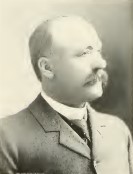 ARNT KJOSNES PEDERSON is the son of Peder
Olson Kjosnes and Helga Arntsdatter Vigen
(Kjosnes).
Following the usual custom of the Norwegian
people, he adopted as his surname Pederson ; that is, to
say, Arnt, of Kjosnes, the son of Peder. He was born
December 28, 1845, in the parish of Selbo, near
Throndhjem, Norway. His ancestors were nearly all
tillers of the soil. On account of the father being in
straightened circumstances financially, the children (of
whom there were eight) were compelled in early youth to
help in the work on the farm. ARNT KJOSNES PEDERSON is the son of Peder
Olson Kjosnes and Helga Arntsdatter Vigen
(Kjosnes).
Following the usual custom of the Norwegian
people, he adopted as his surname Pederson ; that is, to
say, Arnt, of Kjosnes, the son of Peder. He was born
December 28, 1845, in the parish of Selbo, near
Throndhjem, Norway. His ancestors were nearly all
tillers of the soil. On account of the father being in
straightened circumstances financially, the children (of
whom there were eight) were compelled in early youth to
help in the work on the farm.
From his eighth to his twelfth
year, Arnt alternately worked at his own home and for
his neighbors, his younger brothers having grown up so
he could be spared from home. He received his education
in the common “religious school.” which he attended
until his fifteenth year. He then left home and
commenced work in a sawmill, continuing in this
occupation for four years, until he was unfortunate
enough to have three fingers cut off. The following
winter he drove a team, but in the spring started at
work in a sawmill again, where he remained for five
years, or until 1869, when he emigrated to America.
Having no money of his own, he borrowed sufficient funds
to cross the ocean, and arrived in Minneapolis May 16,
1869. He immediately commenced work at his former
occupation, that of tending a circle saw in a sawmill.
He kept steadily at this work for eleven years, when he
was compelled to quit on account of the growing weakness
of his eyes, caused by constant straining.
During this time, however Mr.
Pederson had been frugal in his
habits and had obtained a house and a lot in
Minneapolis. This he has mortgaged
for two thousand and five hundred dollars, and getting a
bill of lumber, he went to Appleton, Minnesota,
where he engaged in the lumber business. In this he has
been very successful, now conducting one of the most
extensive lumber and hardware business, between
Minneapolis and Aberdeen. At first, on account of the
money he had outstanding among the farmers, Mr. Pederson
was somewhat handicaped in securing credit for lumber,
and remembers with grateful appreciation the assistance
afforded him by the old Washburn Mill Company, and
states that they were more beneficial to him than the
commercial agencies. In connection with his lumber and
hardware business, Mr. Pederson also owns a
tin shop and a harness shop.
and deals in lime, brick, plain wood, coal,
etc. He was instrumental in
organizing the Citizens Bank, of Appleton, in i8c)2. of
which institution he is president.
In
politics Mr. Pederson has always cast his lot with the
Republican party, and is an enthusiastic supporter of
its principles. His first vote he cast for General Grant
for president. He has been active in
local politics, but has held no office except that of
town supervisor for two terms, and member of the village
council for twelve years successively, one excepted. On
May 22, 1870, Mr. Pederson was married to Mary O.
Fuglem, who was also born in Selbo, Norway.
They have had ten children, of whom six are
living: five boys and one girl.
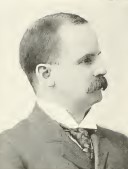 ROBERT L. PENNEY is
a native of Connecticut. He was born at
Watertown, in that state. William Penney, his father,
for many years followed the occupation of farming. In
1870 he moved to New Haven, Connecticut, and engaged in
the boot and shoe business, at which he was moderately
successful. He died at New Haven in 1884, at the age of
seventy-six years. Julia Maria Weller (Penney), the
mother of the subject of this sketch, was a daughter of
Justus Weller, of Bridgewater, Connecticut, who for many
years was a justice of the peace in Litchfield County,
and had the confidence of the community in which he
lived for his honesty and integrity. Mrs. Penney was for
many years a contributor to the popular magazines of her
time, and was a woman possessed of rare graces of mind
and person, her life being an inspiration and a
benediction to her children as well as to all with whom
she came in contact. Her demise occurred at New Haven a
year previous to her husband’s death. ROBERT L. PENNEY is
a native of Connecticut. He was born at
Watertown, in that state. William Penney, his father,
for many years followed the occupation of farming. In
1870 he moved to New Haven, Connecticut, and engaged in
the boot and shoe business, at which he was moderately
successful. He died at New Haven in 1884, at the age of
seventy-six years. Julia Maria Weller (Penney), the
mother of the subject of this sketch, was a daughter of
Justus Weller, of Bridgewater, Connecticut, who for many
years was a justice of the peace in Litchfield County,
and had the confidence of the community in which he
lived for his honesty and integrity. Mrs. Penney was for
many years a contributor to the popular magazines of her
time, and was a woman possessed of rare graces of mind
and person, her life being an inspiration and a
benediction to her children as well as to all with whom
she came in contact. Her demise occurred at New Haven a
year previous to her husband’s death.
The
parents were not able to give their son a collegiate
education, but Robert possessed a strong will and
sufficient courage to work his way, which he ultimately
did, but only after suffering many hardships. Up to his
thirteenth year his education was received in the
district schools. He then went to Millertown, Duchess
County, New York, and for three years attended an
academy at that place. Desiring to enter the Oneida
Conference Seminars at Cazenovia, New York, and not
having sufficient funds to do so, he set about earning
money for that purpose. By working on
neighbors’ farms he was able within a year to accumulate
enough money to pay for the first quarter’s tuition at
that institution. Additional funds were
obtained by teaching school. He graduated from the
Seminary as salutatorian of his class. He then entered
Yale College Law School, graduating in 1876. He stood
third in his class and received honorable mention by
Chief Justice Waite, of the United States Supreme Court,
who delivered the graduating address.
For
some time afterward he lived at Newark, New Jersey, but
thinking the West afforded him better opportunities, he
came to Minnesota in October, 1880, and located at
Minneapolis. His practice at first
was rather limited, but in 1882 he went into partnership
with L. L. Baxter now judge of
the district court at Fergus Falls, Minnesota, and Anton
Grethen, under the firm name of Baxter, Grethen &
Penney. This partnership continued until Mr. Baxter’s
elevation to the bench. He continued in practice alone
for some time until the law firm of Jordan, Penney &
Hammond was formed. This partnership was dissolved by
the removal of Messrs. Jordan and Hammond to Tacoma,
Washington. In 1886 Mr. Penney was elected in the office
of special judge of the municipal court, but the supreme
court declared the election unconstitutional and void.
Two years later he was on the Democratic ticket for
county attorney, but was defeated by Robert Jamison. In
1890 Mr. Penney was nominated on the legislative ticket,
his former opponent being nominated by the Republicans
to the same office. Mr. Penney won, and his nomination
had not been announced more than ten minutes before he
and Mr. Jamison had formed a law partnership, under the
name of Penney & Jamison, which continued until Mr.
Jamison’s appointment to the district bench. Mr. Penney
then formed a partnership with Victor Welch and Marcus
P. Hayne, under the name of Penney, Welch & Hayne.
This partnership was dissolved in April, 1895, since
which time Mr. Penney has practiced alone. He has
enjoyed a large practice, and one that has proven quite
enumerative.
In
national politics he is a sound money democrat but
independent in local matters. He is a member of the A.
F. & A. M., Royal Arch Masons, B. P. O. E., and the
A. O. U. W., also of the Commercial Club of Minneapolis.
He was married in 1875 to Mary E. Leete, daughter of
Thaddeus Leete, of Madison, Connecticut, and has one
child. Florence J. Mrs. Penney is a direct descendant of
William Leete, one of the first governors of
Connecticut.
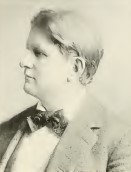 JAMES A. PETERSON
county attorney of Hennepin County, owes what measure of
success he has achieved almost entirely to his own
efforts. His father, Aslak Peterson, a farmer in
ordinary circumstances in Dodge County, Wisconsin, is
still living on the same farm which he patented from the
government under the homestead law. Mr. Peterson’s
mother was Karen Marie Ostenson. Both father and mother
were born near Skien, Telemarken, Norway.
They belonged to the agricultural classes, and
emigrated from that country in 1849. In that year they
settled in Dodge County, Wisconsin, where they have
lived ever since. JAMES A. PETERSON
county attorney of Hennepin County, owes what measure of
success he has achieved almost entirely to his own
efforts. His father, Aslak Peterson, a farmer in
ordinary circumstances in Dodge County, Wisconsin, is
still living on the same farm which he patented from the
government under the homestead law. Mr. Peterson’s
mother was Karen Marie Ostenson. Both father and mother
were born near Skien, Telemarken, Norway.
They belonged to the agricultural classes, and
emigrated from that country in 1849. In that year they
settled in Dodge County, Wisconsin, where they have
lived ever since.
The
subject of this sketch was born near the village of
Alderly, Dodge County, Wisconsin, January 18, 1859. He
attended the country school until fourteen years of age
when he went to school in the neighboring villages of
Hartford and Oconomowoc. Mr. Peterson was
ambitious to obtain a college education, and although
his parents were unable to provide him with means to do
so he did not hesitate to strike out, relying upon his
own resources to get an education. He entered the
sub-freshmen department of the University of Wisconsin
and prepared for college. He entered the freshmen class
in the classical course of the university in the fall of
1880, and graduated from that institution with a degree
of A. B. in 1884. Mr. Peterson taught school part of the
time while he was in college in order to pay his
expenses and earned the money to pay for his own
education through the entire course, with the exception
of the last year when he had help from his father. He
had the legal profession in view and continued the study
of law in the same institution, graduating from the law
department in 1887, with the degree of LL. B. Mr.
Peterson had commenced the study of law in 1885, after
graduation from the university, with W. S. Field, of
Viroqua, and while in the law school studied in the
office of J. L. Connor, of Madison.
He
came to Minneapolis August 18, 1887, and began the
practice of his profession, and has been so engaged in
this city ever since. January 1, 1893, he was appointed
assistant county attorney of Hennepin County by
Honorable Frank Nye, and was re-appointed to the same
office January 1, 1895. Mr. Peterson was elected county
attorney of Hennepin County in November, 1896. He is
also connected in business with Robert S. Kolliner, the
style of the firm being Peterson & Kolliner.
Mr.
Peterson has always been a Republican and has always
taken an active part in politics. He stumped the State
of Wisconsin for Blaine in 1884 the year of his
graduation from college, and did a like service for
Harrison in Minnesota in 1892. He was a member in
college of the Phi Kappa Psi fraternity, is a member now
of the Masonic Order, and belongs to the Knights of
Pythias, in church relations he is an Episcopalian and a
member of Gethsemane Church in Minneapolis.
Mr.
Peterson was married at Perry, Dane County, Wisconsin,
November 19, 1889, to Marie Emilie Dahle. Mrs. Peterson
is a graduate of the University of Wisconsin, in the
same class of which Mr. Peterson was a member, and where
she took the degree of Bachelor of Letters, and is a
lady of fine attainments. Mr. and Mrs.
Peterson have one child living. Amy Bell, born
January 11, 1891.
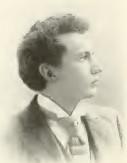 WALTER PETZET Walter
Friedrich Leopold Max Petzet, since he has become a
practical business-like American, simply signs himself
Walter Petzet. His father, Georg
Christian Petzet, is editor-in-chief of the Allgemeine
Zeitung, in Munich. He is a gentleman of fine literary
and artistic attainments, a graduate of the universities
at Leipsic and Munich and for the past thirty years an
editor and publisher of wide influence in southern
Germany. Walter Petzet’s mother, before her marriage,
was Valesca Krause, daughter of an officer in the
Prussian Army. She was descended from an aristocratic
family who held an influential position in the Prussian
court and a high rank in the Prussian Army; in fact, Mr.
Petzet’s grandmother on his mother’s side was a von
Foris et Valois, from that celebrated French family
which gave France several kings. Her grandparents were
among the persecuted Hugenots, who were obliged to leave
France and make their home in Prussia under Frederick
the Great. WALTER PETZET Walter
Friedrich Leopold Max Petzet, since he has become a
practical business-like American, simply signs himself
Walter Petzet. His father, Georg
Christian Petzet, is editor-in-chief of the Allgemeine
Zeitung, in Munich. He is a gentleman of fine literary
and artistic attainments, a graduate of the universities
at Leipsic and Munich and for the past thirty years an
editor and publisher of wide influence in southern
Germany. Walter Petzet’s mother, before her marriage,
was Valesca Krause, daughter of an officer in the
Prussian Army. She was descended from an aristocratic
family who held an influential position in the Prussian
court and a high rank in the Prussian Army; in fact, Mr.
Petzet’s grandmother on his mother’s side was a von
Foris et Valois, from that celebrated French family
which gave France several kings. Her grandparents were
among the persecuted Hugenots, who were obliged to leave
France and make their home in Prussia under Frederick
the Great.
Walter Petzet was born October 10,
1866, at Breslau. He received the educational training
regarded as necessary in cultured German families. He
attended the gymnasium in Breslau and also in Augsburg,
and later took lectures at the Munich University.
In 1882 he entered the Munich Royal Academy of
Music where he studied counter-point and composition
with Joseph Rhineberger, score reading and conducting
with Ludwig Abel; piano with Joseph Gichrl. and
graduated at the head of his class, in 1886. In 1885,
while a student, he was awarded a special diploma for
excellence in piano playing, the only one granted at
that place for three years. Many of his compositions
were brought out while he was studying at that
conservatory, and when he was only eighteen years of age
he played a concerto with orchestra, of his own
composition, in public. After leaving the
conservatory he went in 1887 to Frankfurt to study with
Hans von Bulow.
About this time Mr. Petzet was
induced to come to America, and in the fall of 1887 he
arrived in the United States. He spent the first three
years in Minneapolis, being attached part of the time to
the Northwestern Conservatory of Music. In 1890 he
accepted a position in the Chicago Musical College at
double the salary he had been receiving in Minneapolis,
remained there for about a year, and in 1891 went to New
York City on a two years’ contract as first teacher of
advanced classes in piano and theory at the Schanvenka
Conservatory. He declined further engagement with that
institution and devoted a year to composing and
practicing, giving but few private lessons.
In
1894 he was engaged as director of the Musical
Department of the Planning College in Minneapolis, but
has recently withdrawn from that institution and is
engaged as a private teacher of the piano, Mr. Petzet
has re-visited his old home since he came to America,
and in fact has crossed the ocean nine times. On one of
these trips, on August 23, 1889, he was married to Miss
Antonie Abel, daughter of one of his early instructors,
the celebrated violinist, Prof. Ludwig Abel, concert
master of the Bavarian Court Orchestra and inspector of
the Royal Academy of Music in Munich. Mr. and Mrs.
Petzet have one child, EIva Leonore Susanne, born August
4, 1891, in Munich.
Prof. Petzet has devoted
considerable time in musical composition. His works are
mostly manuscript and in part large pieces for orchestra
and chorus and among them is an opera. Several have been
preformed with great success, and his newest production,
a symphonic poem, has been accepted by the Philharmonic
Orchestra of Munich, which is in itself a rare honor.
His published compositions include songs, piano and
chamber music, and choruses, and have been brought out
in Boston, Cincinnati, in Leipsic, Berlin and
Vienna.
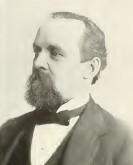 CHARLES ALFRED
PILLSBURY, is a name more widely known than that of any
man in Minnesota. He was for a long time
the head of the famous milling firm of Charles A.
Pillsbury & Company, and is now manager of the
Pillsbury-Washburn syndicate, the largest flour milling
organization in the world. Mr. Pillsbury is a native of
New Hampshire, having been born at Warner, Merrimac
County, October 3, 1842, the son of George A. Pillsbury,
a merchant of that place, now a resident of Minneapolis,
ex-mayor of the city, a member of the milling firm of C.
A. Pillsbury & Co., and identified with many of the
important enterprises of this city. CHARLES ALFRED
PILLSBURY, is a name more widely known than that of any
man in Minnesota. He was for a long time
the head of the famous milling firm of Charles A.
Pillsbury & Company, and is now manager of the
Pillsbury-Washburn syndicate, the largest flour milling
organization in the world. Mr. Pillsbury is a native of
New Hampshire, having been born at Warner, Merrimac
County, October 3, 1842, the son of George A. Pillsbury,
a merchant of that place, now a resident of Minneapolis,
ex-mayor of the city, a member of the milling firm of C.
A. Pillsbury & Co., and identified with many of the
important enterprises of this city.
Charles A. Pillsbury graduated from
Dartmouth College at the age of twenty-one. His
collegiate course was interrupted somewhat by teaching
school as a means of partial self-support while in
college. Soon after the completion of his college course
he went to Montreal, where for six years he was engaged
in mercantile pursuits, the greater part of the time as
a clerk. In 1869 he came to Minneapolis, where he bought
an interest in a small flouring mill at the Falls. There
were then four or five mills located there, of the
old-fashioned pattern, using buhr stones for grinding
grain. Mr. Pillsbury’s business habits led him to a
thorough investigation of the methods of the business in
which he is engaged and he applied himself industriously
to mastering the details of flour milling. This was
about the time of the invention of the middlings
purifier, a Minneapolis device which greatly improved
the quality of the flour and increased the profits of
the milling business.
Mr.
Pillsbury was among the first to adopt the new invention
and reaped a rich harvest on account of the reputation
which his celebrated “Pillsbury’s Best” attained before
the new device came into general use. Simultaneously
with the invention of the middlings purifier came the
introduction of the roller mill, which took the place of
the buhr stone and substituted steel rollers. The
Minneapolis mills enjoyed a practical monopoly of this
new process for a number of years and profited by it.
These improvements enabled the millers to manufacture
from spring wheat the finest quality of flour and
stimulated the wheat growing industry of the Northwest.
In 1872 Mr. Pillsbury associated
with him his father, George A. Pillsbury, his uncle,
John S. Pillsbury having been with him since the
beginning, and enlarged the scope of his operations. At
a later period his brother, the late F. C. Pillsbury,
was admitted to the firm which continued as Charles
A. Pillsbury & Co.,
until the acquisition of the milling property of this
firm and that belonging to W. D. Washburn by an English
syndicate, under the name of the Pillsbury-Washburn
syndicate. Mr. Pillsbury’s
phenomenal success in the management of this business
led to his engagement as manager for the syndicate, in
which he also retained a large interest. Under the
ownership of the firm of C. A. Pillsbury & Co., the
original mill had been added to by purchase and lease
until it included the great mill called “Pillsbury A,”
with a capacity of over 9,000 barrels a day, and other
mills making up a total capacity of about 15,000
barrels. The consolidated property has a capacity now of
over 20,000 barrels a day.
The milling industry at the Falls has taken up
all the water power available under present conditions,
and last year the English syndicate undertook, upon Mr.
Pillsbury’s recommendation, the construction of another
dam below the Falls which will add 10,000 horse power to
the capacity already provided. An important feature of
the administration of this immense business has been the
introduction of the profit sharing plan by Mr.
Pillsbury, under which as high as $25,000 has been
provided among the employees in one year.
Mr.
Pillsbury is identified with numerous other important
enterprises and is prominent in benevolent and
philanthropic undertakings, his large resources and
liberal hand contributing to the support of many
charitable institutions, both public and private. While
Mr. Pillsbury is a prominent Republican and has never
sought political honors he has not shirked his political
duties, and for ten years he served his city as state
senator. During most of that time he occupied the
position of chairman of finance committee and had charge
of the bill which his uncle, then governor, had
recommended for the adjustment of state bonds. Mr.
Pillsbury is a man of robust health and buoyant
spirits, popular with all classes, readily accessible at
all times, alive to the interests of his city, and
devotes a great deal of time for so busy a man to the
promotion of its best interests, politically,
economically and educationally.
He
is an attendant of Plymouth Congregational Church, was
for a long time trustee of that society and is a liberal
supporter of its work. He was married September 12,
1866, to Mary A. Stinson, of Goffston, New Hampshire, a
daughter of Captain Charles Stinson. They have two
sons.
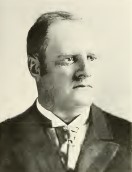 FRED CARLETON
PILLSBURY The name of Pillsbury is inseparably connected
with the history of Minnesota and the development of her
greatest manufacturing interests.
The youngest of the four men of this name who
came to Minnesota in early days was Fred C. Pillsbury.
He was a son of George A. Pillsbury, brother to
Charles A. Pillsbury and nephew of ex-Governor John S.
Pillsbury. His death in the prime of life, on May 15,
1892, deprived the city of a leading businessman and an
active and useful member of the community. FRED CARLETON
PILLSBURY The name of Pillsbury is inseparably connected
with the history of Minnesota and the development of her
greatest manufacturing interests.
The youngest of the four men of this name who
came to Minnesota in early days was Fred C. Pillsbury.
He was a son of George A. Pillsbury, brother to
Charles A. Pillsbury and nephew of ex-Governor John S.
Pillsbury. His death in the prime of life, on May 15,
1892, deprived the city of a leading businessman and an
active and useful member of the community.
Fred C. Pillsbury was born in
Concord, New Hampshire, on August 27, 1852. He was
educated in the schools of Concord and graduated from
the high school of that place. He did not attend
college. His brother Charles was a graduate of
Dartmouth, but Fred’s strong desire to enter active
business life led him to forego a college education, and
in 1870 he came to Minneapolis and entered the store of
his uncle, John S. Pillsbury, who at that time carried
on an extensive wholesale and retail hardware
business. The natural business
instincts of the young man and the careful training of
his uncle brought him rapidly to a high rank as a
businessman. His business judgment,
his common sense, his calmness, and his quickness and
readiness to act in business matters soon marked him for
a successful business career.
In
1876 he became a partner in the milling firm of Charles
A. Pillsbury & Co. An experience of fourteen years
as an active manager in the largest milling concern in
the world gave him a mastery of the business. Upon the
sale of the Pillsbury properties to the
Pillsbury-Washburn Flour Milling Company he joined with
other gentlemen in Minneapolis in organizing the
Northwestern Consolidated Milling Company, of which he
became a director and one of the managing
committee. Up to the time of his
death he was recognized as one of the leading millers of
the United States, and his judgment in the milling
business, and in fact in all business matters, was
regarded as of the highest quality.
Outside of the milling business he
was interested in many of the enterprises of the city.
He was a director in the first National Bank and the
Swedish-American Bank. Mr. Pillsbury was always greatly
interested in agriculture. At Wayzata, Minnesota, on the
shores of Lake Minnetonka, he maintained a model farm
which was famed for its blooded stock and was the pride
of its owner. For two years Mr. Pillsbury was president
of the State Agricultural Society, and gave much time
and personal attention to the management of the state
fair.
In
political faith Mr. Pillsbury was a
Republican, though he never held an elective office. He
was a student of the political questions of the day and
alive to the issues before the people. As a member of
the building committee of the Minneapolis Club, Mr.
Pillsbury had much to say in the construction and
furnishing of the beautiful club house of that
organization. He had a taste for art matters and took
great pleasure in building, and ornamenting with
specimens of the highest art, a beautiful home on Tenth
Street, in Minneapolis. Mrs. Pillsbury was
Miss Alice Cook, of Minneapolis. She was married to Mr.
Pillsbury on October 10, 1876.
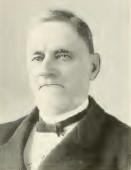 GEORGE A.
PILLSBURY Few names are better known in Minneapolis than
that of Pillsbury. George A. Pillsbury, the elder of the
Pillsbury family, became a resident of Minneapolis in
1878. He was a native of New Hampshire, where he was
born August 29, 1816. He received a common school
education, and at the age of eighteen found his first
employment with a grocer in Boston. After a little more
than a year he returned to Sutton, New Hampshire, where
he had been brought up, and engaged in the manufacture
of stoves and sheet iron, with his cousin, J. C.
Pillsbury. GEORGE A.
PILLSBURY Few names are better known in Minneapolis than
that of Pillsbury. George A. Pillsbury, the elder of the
Pillsbury family, became a resident of Minneapolis in
1878. He was a native of New Hampshire, where he was
born August 29, 1816. He received a common school
education, and at the age of eighteen found his first
employment with a grocer in Boston. After a little more
than a year he returned to Sutton, New Hampshire, where
he had been brought up, and engaged in the manufacture
of stoves and sheet iron, with his cousin, J. C.
Pillsbury.
During the next ten years he was
engaged in various mercantile enterprises, and in 1851
was appointed purchasing agent for the Concord Railroad
corporation. He moved to Concord
and continued in this position for nearly twenty-four
years. In 1864, Mr. Pillsbury, with others, organized
and put in operation the First National Bank of
Concord. Two years later he
became its president. In 1867 he organized
the National Savings Bank of the same place. During his
life in New Hampshire Mr. Pillsbury held several town
and municipal offices, including the office of mayor of
Concord, in 1876 and 1877. In 1871 and 1872 he sat in
the New Hampshire legislature. Upon the announcement of
his determination to leave Concord in the spring of
1878, complimentary resolutions were unanimously passed
by both branches of the city government, by the
directors of the First National Bank, by the First
Baptist church and society, and by the Webster Club, of
Concord. A similar testimonial was presented to him
bearing the names of more than three hundred of the
businessmen of the city.
For
some years previous to his coming to Minneapolis, Mr.
Pillsbury had been a member of the great milling firm of
Charles A. Pillsbury & Co.
After coming here he took a more active part in
the affairs of the concern, and also became identified
with many of the business enterprises of the city. Among
the various corporate and public trusts which he has
filled are these: President of the Board of Trade, of
the Homeopathic Hospital, of the Free Dispensary,
Chamber of Commerce, Pillsbury & Hurlburt Elevator
Company. Vice-President of the
Minnesota Loan & Trust Company, Director and
President of the Northwestern National Bank, Director of
the Manufacturers’ National Bank, of the Minneapolis
Elevator Company, and of the Northwestern Guaranty Loan
Company. He has also served as President of the St. Paul
and Minneapolis Baptist Union, of the Minnesota Baptist
State Convention, and as trustee of the Chicago
University. In 1888, at the annual
meeting of the American Baptist Union, he was elected
its president.
Not
long after his arrival in Minneapolis, Mr. Pillsbury was
elected a member of the Board of Education. He was also
made alderman, and became a member of the city council.
In 1884 he was nominated by the Republican city
convention as its candidate for mayor. After a brief but
determined canvass Mr. Pillsbury was elected by a
majority of eight thousand. His administration was
characterized by the devotion to detail, and economy in
expenditure. As mayor he was ex-officio member of the
park and water works boards, as well as head of the
police department. In his inaugural
message Pillsbury suggested that saloons should not be
licensed in the residence portions of the city.
The development of this idea by Captain Judson N.
Cross, then city attorney, gave to Minneapolis the
“patrol limits” system of saloon restriction.
During his active life in Minneapolis, Mr.
Pillsbury has been closely identified with the higher
life of the city, and has taken an interested and
intelligent part in the development of religion and
education.
About ten years ago he served as
chairman of the building committee of the First Baptist
church, of which he had been a most prominent member
since his settlement in this city, and the edifice which
was erected under his charge is one of the finest in the
Northwest. Upon its completion.
Mr. and Mrs. Pillsbury with their two sons, placed in
the church, at their own expense, the largest and best
organ in the city. At about the same time Mr. Pillsbury
made most liberal donations to the Minnesota Academy at
Owatonna, Minnesota. This school was under the patronage
of the Baptist state convention.
In 1886 he built, at a cost of thirty thousand
dollars, a Ladies’ Boarding Hall, containing all the
modern conveniences and appointments of such a building.
In recognition of his gift the name of the institution
was changed to Pillsbury Academy. In later years Mr.
Pillsbury has aided this institution by building a forty
thousand dollar academic building, handsomely equipped:
a music hall, a drill hall, a steam plant and other
improvements at a cost of about sixty thousand
dollars. He has also
contributed a sum of more than forty thousand dollars
for endowment and current expenses.
But
while doing so much for the state of his adoption, Mr.
Pillsbury was not unmindful of his early home. In the
year 1890 he made three notable gifts. To Concord he
gave a free hospital, at a cost of seventy-two thousand
dollars. To Warner he presented
a free public library, and to Sutton a soldiers’
monument.
Mr.
Pillsbury was married on May 9, 1841, to Miss Margaret
S. Carlton. They had two
sons, Charles A. Pillsbury and Fred C. Pillsbury, who
early became known in connection with their extensive
milling operations in Minneapolis. Charles A. Pillsbury
is still at the head of the Pillsbury-Washburn Flour
Mills Company, and Mr. Fred Pillsbury died a few years
ago.
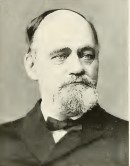 JOHN SARGENT
PILLSBURY is so closely identified with the history of
Minnesota that to write his history fully and completely
would be to write the history of the state during the
last twenty-five years. Mr. Pillsbury was born at
Sutton, New Hampshire, July 29, 1828. His parents were
John Pillsbury and Susan Wadleigh (Pillsbury), and his
descent on both sides was from the original Puritan
stock. The family on his father’s side started, in
America, with Joshua Pillsbury, who received a grant of
land at Newburyport, Massachusetts, a portion of which
still belongs to the Pillsbury family, and came from
England in 1640 to occupy it. JOHN SARGENT
PILLSBURY is so closely identified with the history of
Minnesota that to write his history fully and completely
would be to write the history of the state during the
last twenty-five years. Mr. Pillsbury was born at
Sutton, New Hampshire, July 29, 1828. His parents were
John Pillsbury and Susan Wadleigh (Pillsbury), and his
descent on both sides was from the original Puritan
stock. The family on his father’s side started, in
America, with Joshua Pillsbury, who received a grant of
land at Newburyport, Massachusetts, a portion of which
still belongs to the Pillsbury family, and came from
England in 1640 to occupy it.
The
fourth child of John and Susan Pillsbury is the subject
of this sketch. The opportunities for an education
afforded him were limited, and in his early teens he
began to learn the painter’s trade, but his natural
taste for trade and merchandise led him to engage as
clerk for his brother, George A., in a general country
store at Warner, New Hampshire. Soon afterwards,
reaching his majority, he formed a partnership with
Walter Harriman at Warner, and a singular fact is that
in after life Harriman became governor of New Hampshire
and Pillsbury governor of Minnesota. The experience
which he obtained in the New England country store laid
the foundation for his business success afterward. After
dissolving partnership with Harriman, Mr. Pillsbury
removed to Concord, and for two years was engaged in the
business of merchant tailoring. At this time he was a
watchful observer of the development of the Northwest,
and in 1853 started on a prospecting trip, which finally
brought him, in June, 1855, to Minnesota.
He
settled permanently at St. Anthony, persuaded that there
would ultimately be a great city. He engaged in the
hardware business with George F. Cross and Woodbury
Fiske. Those were the days of “wild cat” banks and
depreciated currency, and with the panic of 1857 the
ability and courage of the young merchants were tested
to the utmost. Added to this came a fire, which, in a
single night, entailed the loss of forty-eight thousand
dollars. But this did not discourage John S. Pillsbury.
He reorganized the business, paid off the debts of the
firm, and in a few years found himself better off than
before. In 1875 he sold his hardware business for the
purpose of engaging more extensively in the milling
business, in which he had embarked with his nephew,
Charles A., under the firm name of C. A. Pillsbury &
Co.
Early in his career Mr. Pillsbury
had become a leader in local affairs, and in 1858 was
elected a member of the city council of St. Anthony, and
was retained in that position for six years. At the
outbreak of the war he rendered efficient service in
organizing the First, Second and Third regiments, and in
1862 assisted in organizing and equipping a mounted
company for service in the Indian outbreak. One of the
most interesting chapters in the history of Mr.
Pillsbury relates to his services to the state
university. This institution had received a grant of
forty-six thousand acres of land in 1851. In 1856 this
land was mortgaged for forty thousand dollars for the
erection of university buildings. In 1857 the main
building was completed and a mortgage of fifteen
thousand dollars placed on it. When the crisis of 1857
came the trustees were unable to meet their obligations,
and creditors were clamorous.
After two or three years of hopeless effort the
friends of the university despaired of preserving it,
and the executive, in 1862 recommended to the
legislature to give all the lands in settlement for all
the indebtedness of the institution.
Mr. Pillsbury, however, had been making a study
of the affairs of the institution, and having been
appointed one of the regents in 1863 began an
investigation of its affairs and adopted a plan which
finally resulted in fully discharging all out standing
obligations saving to the university upwards of
thirty-three thousand acres of the land grant, with the
grounds and buildings, and putting it on the road to the
phenomenal success which it has since attained. Gov.
Pillsbury has earned the name of the “Father of the
University,” given him by the grateful students of that
institution, and has crowned his long years of service
as regent with a gift of one hundred and fifty thousand
dollars, made in 1889.
In
1875 without any effort on his part, Mr. Pillsbury was
nominated by the Republicans and elected governor.
Following the ravages of war the state had
suffered from a severe grasshopper scourge, and poverty
and discouragement were widespread among the people.
This was the condition of things when Gov. Pillsbury
assumed the reins of government.
All the more remarkable, therefore, was his plea
for the honor of the state, and his insistence that the
state discharge her obligations which had been
repudiated. The distress among the people, particularly
in the district ravaged by grasshoppers, appealed to his
sympathy and enlisted his aid. Unwilling to trust the
matter to anyone else, he resolved to make a personal
investigation, accordingly he started incognito and
visited the affected parts of the state; he found
conditions even worse than had been reported.
In many cases the settlers had nothing but
twisted hay for fuel, and potatoes and shorts for food.
Upon his return Governor Pillsbury made an appeal for
aid and personally superintended the distribution of
supplies.
It
was during his first term as governor that the famous
raid of the Younger brothers occurred, and to Gov.
Pillsbury’s cool and practical judgment was due, in
large measure, the capture of those noted outlaws.
He was renominated and re-elected in 1877, and
entered upon the discharge of his duties under much
brighter skies than when he began two years earlier. The
grasshopper scourge had passed, the crops of the
previous year had been abundant and the people were
encouraged. One of the important acts of his second term
was the appointment of Henry M. Knox as public examiner,
an office created at Mr. Pillsbury’s
recommendation. He renewed his
recommendation for the payment of the railroad bonds,
but the legislature under the influence of adverse
public sentiment failed to respond.
A
controversy had arisen between the settlers on lands
granted to the St. Paul & Pacific
Railroad and the Western Railroad Company the successor
to the St. Paul & Pacific and Gov. Pillsbury spent
eighteen months in making satisfactory settlement
whereby he secured homes for three hundred
settlers. These and numerous
other services performed by him not required under the
scope of his office, caused him to be regarded with
singular confidence and esteem by the people, who took
peculiar satisfaction in re-electing him to a third
term. Among these
extraordinary services were his contributions from his
private funds to the aid of the grasshopper sufferers,
and the advancement from his own pocket of some
seventy-five thousand dollars to carry on the state
prison, in order to avoid calling an extra session for
the purpose of making an appropriation.
Throughout his term of office he
worked hard to secure an honorable adjustment of the
railway bond troubles. It happened that during the early
days of the state, bonds had been granted to railroads
to aid in construction work.
The companies failed, and their obligations to
the people were unfulfilled. New companies were formed
and they were allowed to assume the grants of the
defunct companies, but no provisions were made as to
assuming the promises of the old companies. The people
felt that they had been deceived and so tried to avoid
payment. During his last term Governor Pillsbury finally
effected a compromise settlement.
He arranged to pay half the face of the bonds and
interest on the whole at four and one-half percent. By
this means the honor of the state in the financial world
was reestablished.
It
was during his third term, March 1, 1881, that the
capitol was burned. It was within four days of the end
of the session of the legislature.
The governor acting with characteristic
promptness and sagacity procured an estimate on the cost
of rebuilding, transmitted the result to the legislature
with an earnest recommendation for an appropriation and
secured it thus escaping an extra session and a
controversy over a site. During his occupancy of the
governor’s chair Mr. Pillsbury was required
to select three men for positions on the supreme bench.
He nominated Hon. Greenleaf Clark, of St. Paul, Judge
William Mitchell of Winona and Judge Daniel A.
Dickinson, of Mankato, all lawyers of distinction and a
notable part in connection with the appointment of
Mitchell and Dickinson was that they were both members
of opposing political parties.
During all this time while Gov.
Pillsbury was conducting the affairs of the state, his
private interests were not neglected. At that time was
being laid the foundation of the great Pillsbury milling
interests, the fame of which is known round the world.
He also engaged heavily in lumbering and real estate,
and became identified with the construction of
railroads, holding the office of director in the
Minneapolis & St. Louis and the Minneapolis, St.
Paul & Sault Ste. Marie. He has been a
director in several of the leading Minneapolis banks and
the Minneapolis Stock Yards Company. He is a man who
discharges business easily and without worry, and has
time for the social and public duties besides.
He is an officer of the first Congregational
church of Minneapolis, to which he has contributed
generously, among his gifts being the splendid organ
presented by him and his wife. He is a man of simple
tastes, quiet manners, unostentatious, sincere and
earnest.
He
has impressed himself upon the commonwealth probably
more than any other man who has ever lived in it. His
benefactions have not been confined to the state of
Minnesota or the city of Minneapolis. At Sutton, New
Hampshire, his native town, he has erected a handsome
memorial hall, arranged for the use of the selectmen,
for the accommodation of a library, and containing a
hall which will seat three hundred people.
Gov. Pillsbury was married in
Warner, New Hampshire, November 3, 1856, to Mahala Fisk,
a most estimable lady, who has, by her sympathetic and
helpful association contributed much to his honor and
success.
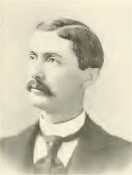 WILLARD BYTHER PINEO, of
Minneapolis, is a specialist in diseases of the eye,
ear, nose anil throat. Dr. Pineo was born at Columbia,
Maine, April 22, 1858. His father Benjamin C. Pineo, was
a stone contractor in moderate circumstances. His
mother’s maiden name was Cordelia W. Ramsdell. On his
father’s side, Dr. Pineo is descended from Jacques
Pineau, the French Huguenot, who landed at Plymouth in
1700. Dr. Timothy Stone Pinneo, grand uncle of Willard,
was the author of Pinneo’s Grammars and the revisor of
the .McGuffey readers. He graduated from the classical
and medical departments of Yale College with high
honors, and was professor of belles lettres at Marietta
College, Ohio. Still later he was at the head of a
school in Greenwich, Connecticut. Dr.
Peter Pineo, of Boston, another grand uncle, was
distinguished for his splendid war record. WILLARD BYTHER PINEO, of
Minneapolis, is a specialist in diseases of the eye,
ear, nose anil throat. Dr. Pineo was born at Columbia,
Maine, April 22, 1858. His father Benjamin C. Pineo, was
a stone contractor in moderate circumstances. His
mother’s maiden name was Cordelia W. Ramsdell. On his
father’s side, Dr. Pineo is descended from Jacques
Pineau, the French Huguenot, who landed at Plymouth in
1700. Dr. Timothy Stone Pinneo, grand uncle of Willard,
was the author of Pinneo’s Grammars and the revisor of
the .McGuffey readers. He graduated from the classical
and medical departments of Yale College with high
honors, and was professor of belles lettres at Marietta
College, Ohio. Still later he was at the head of a
school in Greenwich, Connecticut. Dr.
Peter Pineo, of Boston, another grand uncle, was
distinguished for his splendid war record.
The
subject of this sketch received his early education at
Oak Hill Seminary at Bucksport, Maine, and Kent’s Hill
Seminary at Redfield, Maine. In September, 1882, he came
to Minnesota and not long afterwards began the study of
medicine. He received medical diplomas from the
Minnesota Hospital College and from the medical
department of the University of Minnesota in 1885. He
was valedictorian of his class and president of the
alumni association. During the winter of 1889-90 he
received instruction on the eye, ear, nose and throat at
the Polyclinic and Manhattan Eye and Ear Infirmary of
New York city. During the year 1895 he made a tour of
the eye and ear hospitals of Berlin, Vienna, Paris and
London. Dr. Pineo owes little
to anyone but himself for the success which he has
attained in his profession, the money necessary to
enable him to pursue his medical studies having been
earned while teaching in the public schools. For five
years following his graduation from the university,
Dr. Pineo was associated
with Dr. Dunsmoor in the general practice of medicine in
the city of Minneapolis, but since that time he has made
a specialty of the diseases of the eye, ear, nose and
throat, and has confined himself to that line of
practice.
In
politics he is a Republican and a reliable supporter of
Republican principles, although he has never taken a
very active part in politics. He is a member of the
Minneapolis Commercial Club, the Minneapolis Whist Club,
the Benevolent and Protective order of Elks, and has
received all the degrees conferred in Masonry in this
state. He is past master of Hennepin Lodge, No. 4, and
Minneapolis Council, No. 2, and past junior warden of
Zion Commandery, No. 2. He is at present wise master of
St. Vincent de Paul Chapter of Rose Croix, No. 2. of the
Ancient and Accepted Scottish Rite and is Right
Worshipful District Deputy Grand Master of the state of
Minnesota. He is also vice-president of the Masons
Fraternal Accident Association of Minneapolis.
He was married November 28, 1884.
to Saidie Kendal Cobb, granddaughter of Nathaniel
Cobb, of Boston, the noted
philanthropist.
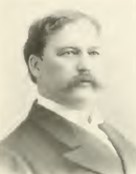 WILLIAM NORTHCOURT
PORTEOUS, M. D., was born in Ontario, Canada, June 20,
1857. His father, David Porteous, was a student of
medicine and surgery in Edinburgh University, Scotland,
but in those days anesthetics were not in use and the
sufferings of patients operated upon so unnerved him
that he gave up the practice, emigrated to New
Brunswick, and engaged in the milling business there. WILLIAM NORTHCOURT
PORTEOUS, M. D., was born in Ontario, Canada, June 20,
1857. His father, David Porteous, was a student of
medicine and surgery in Edinburgh University, Scotland,
but in those days anesthetics were not in use and the
sufferings of patients operated upon so unnerved him
that he gave up the practice, emigrated to New
Brunswick, and engaged in the milling business there.
His
father was an admiral in the British Navy, receiving his
appointment to that rank just before his death. The wife
of David Porteous was Jessie Bell, daughter of a leather
manufacturer conducting a large business in Canada. The
Bell family were also extensively engaged in the lumber
business in that country.
The
subject of this sketch grew up in Ontario, where he
attended the common and grammar schools and prepared for
McGill University at Montreal. After completing a
university course he went to Scotland to pursue his
studies in medicine and surgery at Edinburgh University,
where his father had been a student before him. He also
took a course of study at London College, at London,
England. Like many of the enterprising, ambitious young
men of Canada, Dr. Porteous was attracted by the better
opportunities afforded in the states, and in 1892 came
to Minnesota and settled in Minneapolis for the practice
of his profession. Since his residence here he has made
a specialty of the treatment of the ear, the nose and
the throat, and has attained prominence in his
profession for which he had carefully prepared. Dr.
Porteous is a member of the Presbyterian church.
In 1894 he married Miss Alma Norton Johnson,
daughter of Col. Charles W. Johnson, of
Minneapolis. Mrs. Porteous is a
leader in social and musical circles and the possessor
of a contralto voice of rare quality and
power.
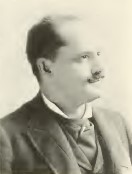 ARTHUR WESLEY PORTER
is a
native of Massachusetts, born at Chelsea,
November 14, 1851, almost in the shadow of Bunker Hill
monument. His ancestors were English Tories living in
Charleston, Massachusetts, at the time of the
Revolution, who, at the beginning of the hostilities,
took advantage of the amnesty offered to the adherents
of the Crown and emigrated to Nova Scotia. The family
subsequently returned to New England, and Asa Porter,
father of Arthur Wesley, took up his residence at
Chelsea. ARTHUR WESLEY PORTER
is a
native of Massachusetts, born at Chelsea,
November 14, 1851, almost in the shadow of Bunker Hill
monument. His ancestors were English Tories living in
Charleston, Massachusetts, at the time of the
Revolution, who, at the beginning of the hostilities,
took advantage of the amnesty offered to the adherents
of the Crown and emigrated to Nova Scotia. The family
subsequently returned to New England, and Asa Porter,
father of Arthur Wesley, took up his residence at
Chelsea.
The
subject of this sketch received his early education
under his mother’s direction, who was for more than
thirty years a public school teacher in Chelsea and
vicinity. He passed through the usual high school
grades, graduating from the Chelsea high school in 1869,
and was accepted for admission to Harvard College. In
the meantime his voice had developed unusual quality and
power and he turned his attention especially to the
study of music. Among his instructors were some of the
finest in this country, T. W. Adams, Signor Ardavani,
George L. Osgood, M. W. Whitney,
the great basso, and Dr. Guilmette, the famous dramatic
singer. Mr. Porter entered
enthusiastically into the study of music and united hard
work to untiring perseverance.
After two years with the quartette choir in St.
Luke’s Church, in Chelsea, he was invited to the
position of basso in the Warren Avenue Baptist quartette
in Boston. He was introduced to the position by Myron W.
Whitney, under whom he was studying. While singing in
this church, a much more flattering offer was received
from the Shawmut Avenue Baptist Church, which he
accepted and where he remained for nearly two years.
During all this time Prof. Porter continued his studies,
developing his voice and preparing himself for the work
of a teacher of vocal music and voice culture.
He came to Minneapolis as early as 1882, and has
resided here ever since, where he has achieved a notable
success as a teacher and won distinction as a vocalist.
He possesses a basso voice of great compass, extending
from C sharp below to F sharp above, and possessed of
dramatic quality, and is equal to all the demands that
may be made upon it for choir or concert singing, for
oratorio or opera. In 1889 the Gounod Club, of
Minneapolis, had arranged to give the oratorio of the
Messiah, assisted by Mrs. Humphrey Allen, of Boston, and
Theodore Toedt, of New York. D. M. Babcock, the
celebrated basso of Boston, was cast for the basso
parts, but suddenly became ill. Upon three hours’ notice
Prof. Porter took his place and sang his score with
entire success, particularly in the great aria “Why Do
the Nations,” for which he was warmly complimented by
Mrs. Allen and Mr. Toedt. Some idea of the elasticity of
his voice may be inferred from the fact that it permits
him to sing successfully the part of “Lucifer” in
Sullivan’s Golden Legend, and also the part of “Elijah”
in the oratorio of that name, and being especially
adapted for the dramatic parts of these works. Mr.
Porter devotes his attention almost entirely to teaching
voice culture, and has won a sure place in the esteem of
the people of Minneapolis as an artist of merit.
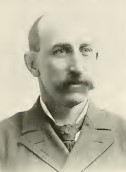 EDWIN GRAHAM
POTTER is a successful merchant, having been engaged in
the wholesale commission business in Minneapolis for the
last fifteen years. Mr. Potter is a native of New York.
He was born at Adams, October 26, 1852.
His father was G. N. Potter, a successful grain
merchant and dealer in livestock. His great grandfather
was Maj. John Potter, who served in the Revolutionary
War, and his grandfather, Edwin Potter, was a soldier in
the war of 1812. EDWIN GRAHAM
POTTER is a successful merchant, having been engaged in
the wholesale commission business in Minneapolis for the
last fifteen years. Mr. Potter is a native of New York.
He was born at Adams, October 26, 1852.
His father was G. N. Potter, a successful grain
merchant and dealer in livestock. His great grandfather
was Maj. John Potter, who served in the Revolutionary
War, and his grandfather, Edwin Potter, was a soldier in
the war of 1812.
Edwin Graham attended the common
schools until fifteen years of age, when he left school
and went into business, and ever since he was eighteen
he has been engaged in the wholesale produce trade. He
came to Minnesota in 1881, and located in Minneapolis,
where he formed a partnership with H. L. Beeman. Two
years later he bought out Mr. Beeman, and his first
year’s business thereafter amounted to $60,-000. He has
since handled as high as half a million dollars worth of
goods in a single year. His business brought him into
close relations with the dairy interests of the state
and he has taken an active interest in promoting that
industry, having served as president of the State Dairy
Association. He prepared and
procured the passage by the legislature of the first law
governing the sale of bogus butter and cheese, the same
law which, with a few amendments, is in operation now.
Mr. Potter is a Republican
and takes an active interest in politics. He has served
the Fourth ward as alderman for four years, and during
two years of that time was president of the city
council. He declined a renomination to the council, but
was nominated by the Republicans for mayor in 1890, and
went down with the rest of his ticket in the political
landslide of that year. He served as the Hennepin County
member of the state central committee during two of the
most fiercely contested campaigns in the history of the
state. In 1894 he was elected
by the Republicans as senator from the Thirty-first
District to the legislature, defeating J. H. Paris by
2,125 plurality. He introduced a number of important
bills during the session, among which the following
became laws: A bill for a constitutional amendment,
providing for the loaning of the permanent school fund
of the state to cities, counties, towns and school
districts within the state. A bill allowing Minneapolis
to issue and sell bonds for school purposes. A bill for
the inspection of milk and dairies by the health
departments of cities. A bill prohibiting the
adulteration of candy. A bill providing for “struck”
juries in certain cases, and a bill limiting the time
for beginning action in personal damage suits. Mr.
Potter is a member of the Commercial Club of
Minneapolis, of the Masonic order and of the Knights of
Pythias. He was married in 1876 to Lena Northey and in
1894 to Anna Keough. He has two children, a daughter
six, and a son four years of age.
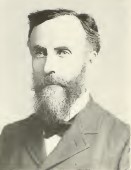 LE GRAND
POWERS State Commissioner of Labor, is a son of Wesley
Powers, farmer and manufacturer, in comfortable
circumstances in Preston, Chenango County, New York. His
mother was Electa Clark. Mr. Powers traces his ancestry,
on his father’s side, back to Jost Pauer, who was born
in Naumberg, Germany, in 1732.
and settled in Duchess County, New York, in 1752;
on his mother’s side his ancestry is traced back to
Edmond Clark, who emigrated from England and settled at
Lynn, Massachusetts, in 1636. His mother’s grandfather,
William Clark, was born at Windham, Connecticut, in
1754. and entered the Continental Army in 1776. He took
part in the battles of Long Island and White Plains. His
mother’s maternal grandfather, Sylvester Miner, served
seven years in the Continental Army, and Jost Pauer was
recorded among the active friends of the patriotic
cause. Others of Mr. Powers’ ancestry, of both his
father’s and mother’s family, were prominent in the
stirring events of Colonial times, and served in the
Continental Army, and were signers of the patriotic
articles and pledges of loyalty circulated after the
battles of Lexington and Concord. Those articles pledged
the signers to support the colonial cause and resist the
unjust demands of the crown. LE GRAND
POWERS State Commissioner of Labor, is a son of Wesley
Powers, farmer and manufacturer, in comfortable
circumstances in Preston, Chenango County, New York. His
mother was Electa Clark. Mr. Powers traces his ancestry,
on his father’s side, back to Jost Pauer, who was born
in Naumberg, Germany, in 1732.
and settled in Duchess County, New York, in 1752;
on his mother’s side his ancestry is traced back to
Edmond Clark, who emigrated from England and settled at
Lynn, Massachusetts, in 1636. His mother’s grandfather,
William Clark, was born at Windham, Connecticut, in
1754. and entered the Continental Army in 1776. He took
part in the battles of Long Island and White Plains. His
mother’s maternal grandfather, Sylvester Miner, served
seven years in the Continental Army, and Jost Pauer was
recorded among the active friends of the patriotic
cause. Others of Mr. Powers’ ancestry, of both his
father’s and mother’s family, were prominent in the
stirring events of Colonial times, and served in the
Continental Army, and were signers of the patriotic
articles and pledges of loyalty circulated after the
battles of Lexington and Concord. Those articles pledged
the signers to support the colonial cause and resist the
unjust demands of the crown.
Mr.
Powers was born at, Preston, New York, July 21,
1847. His early education
was obtained in the common schools of that town, in the
academy at Oxford, New York, and in the Clinton
Institute at Clinton, New York. He entered Tufts
college, at College Hill, Massachusetts, in 1868 and was
there two years. He then came West and finished his
college course at the Iowa State University, Iowa City,
in 1872, graduating with the degree of A. B.
He purposed entering the ministry, and prepared
himself by private study for that profession. He was
ordained as a Universalist clergyman in 1872, the year
of his graduation from the Iowa university.
He
was elected principal of the Iowa Universalist Academy
the same year, and held the position until 1874. He
engaged in pastoral work from 1874 to 1890. During this
time he was for three years superintendent of churches
for Illinois. His last two
pastorates were in Minneapolis, in which city the
present edifice of All Soul’s church was erected under
his direction and largely owing to his efforts. He was
appointed commissioner of labor of the state by Governor
Merriam in 1891 and reappointed by Governor Nelson in
1893, and again by Governor Clough in 1895. Mr.
Powers is a Republican and has taken an active
interest in public questions. His careful study of
economic questions, his sympathies with the masses, his
special interest in the problems confronting the
laboring classes, on which topics he has been recognized
as an able and vigorous speaker, suggested him for the
appointment to this position. He has discharged the
duties of his office with signal ability. His reports
are quoted throughout the country as among the most
valuable compiled on this subject. His work has
attracted the attention of economists in this and
foreign countries, and he is regarded as authority on
the questions which he has investigated in the course of
his official duties. He keeps abreast of the times, and
when W. H. Harvey’s book, “Coin’s Financial School,”
began to attract attention he made a study of it and
prepared an answer, which is regarded as one of the most
able of the many answers written in reply to Mr. Harvey.
The title of his book was “Farmer Hayseed in Town.” It
followed much the same plan adopted by Mr. Harvey, the
dry facts and arithmetical calculations being spiced up
with clever comments of the different characters who
carry on an imaginary discussion of Mr. Harvey’s
propositions. At the time of the
famous debate between Mr. Horr and Mr. Harvey at
Chicago, the former invited Mr. Powers to sit with him
in that debate and assist him in his work. Mr. Powers
has been actively and prominently identified with
educational and philanthropic work in Minneapolis, and
is one of the most enthusiastic promoters of university
extension in this state.
His
identification with clubs, societies, etc., consists of
membership in the Theta Delta Chi, a college fraternity,
the Masonic order, the Modern Woodmen, the Fraternal Aid
Society, Commercial Club of Minneapolis and the Union
League of Minneapolis.
He
is a member of the Universalist church, and in 1873 he
was married to Amanda D. Kinney.
They have had three children, of whom two are
living, Irma, a daughter, and Loren, a
son.
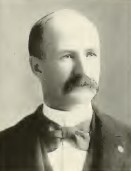 ROBERT PRATT Surrounded by
adverse influences in youth, with limited educational
facilities, but with courage and perseverance acquired
from hard experiences undergone through a service of
four years in the civil war, while yet in his teens,
Robert Pratt, the mayor of Minneapolis, has gradually
climbed the ladder of success. He was born December, 12,
1845, Rutland, Vermont, the son of Sidney Wright Pratt
and Sarah Elizabeth Harkness (Pratt). His father was a
laborer in poor financial circumstances. His mother was
Scotch, coming to this country in 1834. The paternal
grandfather of Robert was a captain in the War of 1812,
and married a South Carolinian. ROBERT PRATT Surrounded by
adverse influences in youth, with limited educational
facilities, but with courage and perseverance acquired
from hard experiences undergone through a service of
four years in the civil war, while yet in his teens,
Robert Pratt, the mayor of Minneapolis, has gradually
climbed the ladder of success. He was born December, 12,
1845, Rutland, Vermont, the son of Sidney Wright Pratt
and Sarah Elizabeth Harkness (Pratt). His father was a
laborer in poor financial circumstances. His mother was
Scotch, coming to this country in 1834. The paternal
grandfather of Robert was a captain in the War of 1812,
and married a South Carolinian.
Robert received his early education
in the district schools, also taking a course in the
Brandon Seminary, at Brandon, Vermont. When but fifteen
years and eight months old, he enlisted at Brandon as a
private in Company H, Fifth Vermont Volunteer Infantry,
and served throughout the entire war.
He was in active service all this time and
engaged in all the principal battles of the army of the
Potomac after Bull Run, serving under McClellan,
Burnside, Hooker, Meade and Sheridan until the close at
Appomatox. At the time he was mustered out, July 12,
1865, he was hardly twenty years of age, yet he had been
promoted to the rank of captain.
The
sufferings experienced by this courageous youth in the
service of his country were such as to prepare him early
for the struggles of life. He had earned his first
dollar by gathering stones on the farm, and from his
first start in business for himself was able to
accumulate money by industry and economical habits. He
came to Minnesota, locating at Minneapolis, in November,
1866, with an invalid brother, who had sought this
climate to regain his health. Robert first began working
by the day, driving a team, and doing any other kind of
work he could find. With the accumulated savings of some
years he embarked in the lumber business for himself,
afterwards, in 1877 or 1878, becoming a dealer in wood
and coal. Mr. Pratt has remained in the fuel business
since that time, having made a success of it, being one
of the largest retail dealers in that line in
Minneapolis.
He
has always taken a prominent part in all enterprises
tending to upbuild the city. His political affiliations
have always been with the Republican party. His first
vote was cast for Lincoln when he was but nineteen years
of age, having earned his right to vote by his three
years’ service in the army. In 1884 he was elected a
member of the city council for a term of three years. He
was also elected a member of the School Board in 1888
for a term of four years, and was re-elected for a term
of six years in 1892. In 1894 he was nominated by the
Republicans for the office of mayor of Minneapolis and
elected. His administration of the office has been a
commendable one, and at the Republican city convention
in August, 1896, he was re-nominated by his party with
but slight opposition, and re-elected by the largest
majority ever accorded a mayor of this city. Mr. Pratt
is a member of the Grand Army, the Loyal Legion, the
Elks, the Masonic fraternity, the Union League, a
director of the Commercial Club and German American
Bank.
He
was married August 30, 1871 to Irene Lamoreaux. They
have six children, Roberta, Helen Clare, Sidney, Robert,
Jr., Sara and Thomas. The two eldest daughters are
graduates of the State University, while the eldest son
is taking his fourth year.
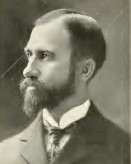 FRANK M. PRINCE is
vice-president of the First National Bank of
Minneapolis. He is the son of George H. Prince and Sarah
E. Nash (Prince.) George H. Prince is at present not
engaged in active business, being in comfortable
circumstances financially. FRANK M. PRINCE is
vice-president of the First National Bank of
Minneapolis. He is the son of George H. Prince and Sarah
E. Nash (Prince.) George H. Prince is at present not
engaged in active business, being in comfortable
circumstances financially.
Frank M. was born at Amherst,
Massachusetts, July 23, 1854. He received a good common
education in the public schools of his native town and
the high school. The first money he
ever earned was carrying mail while attending school
from twelve until he was sixteen years of age. He worked
in a general store after that age until he was twenty
years old, when he came to Minnesota, in December, 1874,
settling at Stillwater. He was for a year employed in
the general store of Prince & French in that city,
and in the winter of 1873 taught school. In April of
that year he obtained employment in the First National
Bank of Stillwater, working as an office boy and general
clerk. He continued in this position until July, 1878,
when he obtained employment in the First National Bank
of Minneapolis, as correspondent and teller. He held
this position until November, 1882, when he returned to
the First National Bank at Stillwater, taking the
position of cashier, January 1, 1883. He remained in
this position for nine years.
On
August 1, 1892, he entered upon his duties as secretary
and treasurer of the Minnesota Loan and Trust Company,
of Minneapolis. He held this position,
however, only two years, when he returned to the First
National Bank of Minneapolis, August 1, 1894, taking the
position of cashier. He was holding this office when he
was elected vice-president of the bank, January 1, 1895.
Mr. Prince is held in high esteem by all his business
associates for his sound judgment and his qualifications
as a shrewd and conservative financier. He is also
interested in other business enterprises, being a
director in the Minnesota Loan and Trust Company, of
Minneapolis; the Stillwater Water Company, the C.
N. Nelson Lumber Company
and the Merchants’ Bank at Cloquet. Mr. Prince’s
political affiliations are with the Republican party. He
is a member of the Minneapolis and Commercial clubs. He
was married April 26, 1883. to Mary Bell Russell. Mrs.
Prince died July 27, 1888.
They had no children.
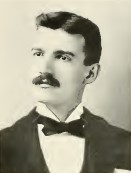 MILTON DWIGHT
PURDY is assistant city attorney of Minneapolis. He was
born November 3, 1866, in the village of Mogadore,
Summit County, Ohio, the son of Milton Gushing Purdy and
Sarah Jane Hall (Purdy). Milton Gushing Purdy resides at
Whitehall, Illinois. His occupation during his whole
life has been that of a manufacturer of stone ware,
except a few years in which he was engaged in the
manufacture of matches at Akron, Ohio. He built the
first match factory in that city, but subsequently sold
it to the Barber Match Company, which is now one of the
largest concerns in the United States. MILTON DWIGHT
PURDY is assistant city attorney of Minneapolis. He was
born November 3, 1866, in the village of Mogadore,
Summit County, Ohio, the son of Milton Gushing Purdy and
Sarah Jane Hall (Purdy). Milton Gushing Purdy resides at
Whitehall, Illinois. His occupation during his whole
life has been that of a manufacturer of stone ware,
except a few years in which he was engaged in the
manufacture of matches at Akron, Ohio. He built the
first match factory in that city, but subsequently sold
it to the Barber Match Company, which is now one of the
largest concerns in the United States.
Milton Dwight removed with his
parents to Illinois in 1870 and located at Whitehall. He
was educated in the public schools in Whitehall, and
graduated from the high school at the age of seventeen
in the class of 1884. Two years after his graduation
were occupied in teaching in Greene County, the first
year at the town of Patterson, the second year in the
public schools of Whitehall, as principal of the grammar
department. For several years
prior to this time Mr. Purdy, during his
summer vacations, worked at and learned the potter’s
trade in his father’s factory.
This work at first brought him about forty cents
a day until he became old enough to have a wheel of his
own when he made all the way from two to five dollars a
day. In this manner and by teaching school for two years
he acquired sufficient funds to enable him to go to
college.
In
the fall of 1886 Mr. Purdy came to Minnesota for the
purpose of entering the State University. He remained in
that institution for six years, in which time he
completed the full classical course and was graduated in
1891 from the collegiate department, and in the class of
1892 from the law school. In the second year at college
he joined the Phi Kappa Psi fraternity.
He took an active part in two oratorical contests
for the Pillsbury prize at the university. In the first
contest he received third place, and in the second
contest was awarded first place. During his last year in
college he received an invitation from the Union League,
of Chicago, to represent the colleges of the state of
Minnesota at the annual banquet of the Union League
given on Washington’s birthday. This was in the spring
of 1892. Mr. Purdy was there as the guest of the Union
League, and delivered an address in the Unity church of
that city.
During the summer of 1890 he entered
the law office of Judge R. D. Russell and read law with
him until after graduating from the law school. After
graduation, in 1892, he located in Minneapolis, and has
since been engaged in the practice of law. The first
part of 1893 he was appointed assistant city attorney by
David F. Simpson, city attorney of Minneapolis, and has
held that position for two terms. He has always been a
Republican and voted anil acted with that party. He is a
member of the Union League and has membership in a
number of such organizations. On January 28, 1893 he was
married to Belle M. Morin, of Albert Lea, who was a
member of his class at the university, and graduated
from that institution in 1891.
The information
on Trails to the Past © Copyright
may be used in personal family history research, with
source citation. The pages in entirety may not be
duplicated for publication in any fashion without the
permission of the owner. Commercial use of any material
on this site is not permitted. Please respect the
wishes of those who have contributed their time and
efforts to make this free site possible.~Thank
you! | | | |



